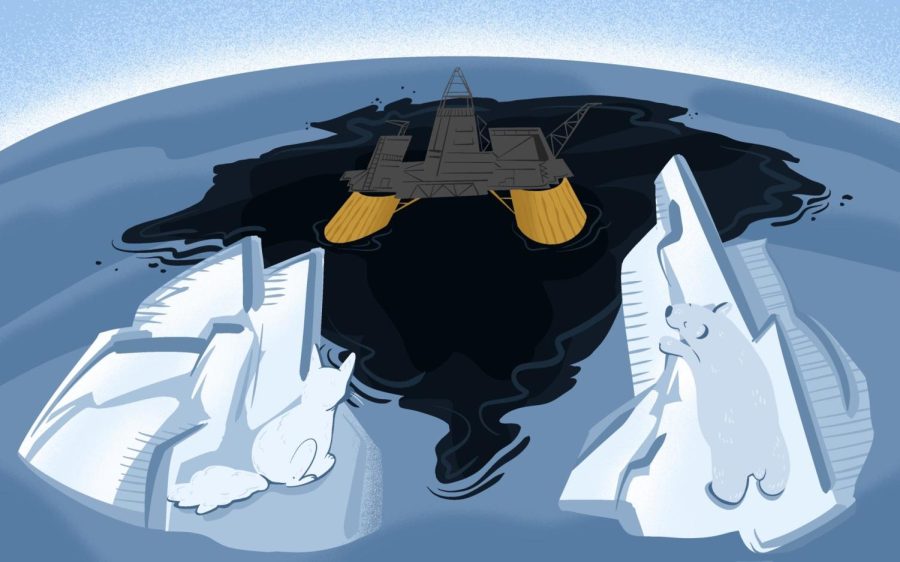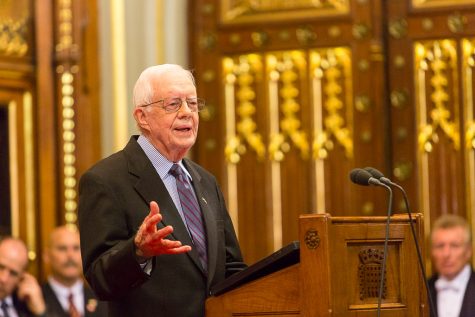Biden’s Arctic oil drilling project met with protest
As climate change becomes more of a hot topic in the political landscape, many nations are taking steps to transition out of fossil fuel dependency. The Biden administration, however, is set to approve a large oil drilling project in the Alaskan North Slope known as the Willow Project.
The Willow Project has been met with criticism from climate activists and Indigenous activists alike, due to the impacts it could have on the Arctic ecosystem.
“[The pipeline] goes from Prudhoe Bay to Valdez, Alaska, and that’s a pipeline that was built through the tundra,” said DePaul environmental science professor James Montgomery. “It’s along migration routes of elk, and it has disrupted those migrations and other things that come along with being an elk, so there’s issues of how it’s impacted migratory wildlife.”
The Arctic tundra in particular has a very delicate ecosystem.
“There are very sensitive and important ecosystems up there [the Arctic tundra] that you don’t find anywhere else because they have adapted for that kind of climate with those being disrupted,” Montgomery said. “Just good old global warming has started to melt the permafrost, and permafrost is permanently or semi-permanently frozen ground, and it often has, trapped in that ice, a lot of methane, and methane is natural gas.”
Methane is the most potent greenhouse gas per molecule, far more potent than carbon dioxide, according to Montgomery.
The Arctic is also warming much faster than the rest of the world, according to DePaul environmental science professor Mark Potosnak.
Even if the U.S. starts the transition to sustainable fuel alternatives, it would still need to rely on oil during the transition phase.
“We’re using a lot of fossil fuels, and there’s a worry that we’re going to start to run out here in the U.S.,” Potosnak said. “So should we drill up there so that we have enough supply in the short term with the understanding we want to move away from them long term?”
It is much more environmentally friendly for the U.S. to drill oil on its own land rather than importing it, according to Tony Kovscek, energy science professor at Stanford University.
“The U.S. needs oil, and it’s arguable that producing those resources at home is better than importing those resources,” Kovscek said. “For instance, the environmental regulations in the U.S., compared to many other producing countries, are pretty strict, so we have some assurance that people follow the laws, and to some extent environmental issues have been mitigated.”
When he first came into office, President Biden vowed to end all new oil drilling projects on public land, according to The Washington Post.
“So the issue is, there are Native American tribes or Indigenous tribes, Indigenous Alaskan tribes up there, like the Inuit, and the Inupiaq,” Montgomery said. “Some are for this, because it’ll bring in more money. But the people in the town … they’re very much against it, because they’re nervous about spills and pollution and things that come along with drilling for oil, and so they feel like, I think, Biden has gone back on his word.”
Potosnak believes that the Willow Project is a strategic move by Biden to help his approval for the upcoming election.
“Because if [Biden] doesn’t, and then oil prices are really high, and whenever the election is, a year and a half from now, his opponents will say, ‘hey, you stopped drilling, everybody’s paying five bucks a gallon for oil,’” Potosnak said.
In reality, the oil drilling project likely will not have any impacts on oil and gas prices for some years.
“You’re talking probably five to eight years, I read, before any oil that is produced from this would actually come online and hit the market,” Montgomery said. “So it’s not like we’re going to have these millions of barrels of oil flowing next week, so the impact on oil and gas prices is a ways off if there’s going to be any impact at all.”
There is also a small potential for oil spills to occur. Most of the oil will be transported over the land, but the major concern is if a spill occurs once the oil is placed on ships.
“There’s a potential for spill,” Potosnak said. “If the pipeline spills, it’s bad, but it’s on land. But when oil spills happen on water, they’re so awful, but this oil … will get put on a boat and shipped from there.”
Other than oil spills, transportation, such as roads and trucks, could damage the environment.
“[An] important question for this development that I don’t know the answer to is where’s the material going to come from, to basically build the pads and build the roads and all that,” Kovscek said. “They’re gonna have to source that, and that potentially can have some impacts? Where do you get the materials from?”
Potosnak, who has worked near an oil rig at the North Slope in the past, observed environmental damage caused by trucks.
“One of the biggest impacts that they experienced is from the road, and you have truck traffic going up and down the road, and that creates a lot of dust, and that dust carries into the ecosystem and ends up changing the ecosystem because it’s different nutrients,” Potosnak said.
Climate change is already having an impact on the Indigenous people of Alaska and Canada, and the Willow Project could further exacerbate the problem.
“This is ancestral land for Indigenous North Americans, you know, both in the United States and Canada, and this is a loss,” Montgomery said. “I mean, climate change in and of itself is affecting these people everything from their fisheries, and it’s really affecting their culture, and not surprisingly, a lot of the young people are leaving their villages, and they’re going to larger cities because they see nothing in the village for them to do.”
Despite all the opposition, it is highly likely that the Biden administration will approve the Willow Project.
“I call it cultural genocide,” Montgomery said.












